#wes anderson analysis
Explore tagged Tumblr posts
Text
#just curious cause id die if an irl asked for my tumblr account#probably just me though#just tagging some of my fandoms >#wes anderson#owen wilson#stranger things#good omens#ineffable husbands#loki#lokius#ofmd#literture#media analysis#not really sorry#our flag means death#will byers#mike wheeler#byler#tumblr#polls#tumblr polls#statistics
323 notes
·
View notes
Note
Before Neil’s parents came and cleared out his side of the room, Todd went through his things, grabbing homework assignments, midsummer night's dream scripts, his favorite green jumper-things that mattered to him.
The trivial items went in a box under Todd’s bed, but Neil’s jumper which still smelled like him despite constant washes, never disappeared from his sight. Todd couldn’t bring himself to wear it, but holding it and breathing in the sweet scent was the only thing that kept him from crying himself sick when he’d wake up in a panic.
And then years later, when Todd fled from Vermont's strictness and went to seize his life in New York, where he could experience real life and true emotions, he still hid the box in a corner of his cramped room.
He still has Neil's things, fragments of his life, hidden in the same little box. And every 15th of December he would open it and go through Neil things again, remembering how this golden boy used to shine with truthfulness and life. The boy who gave him hope and joy and dreams. The smell is gone from Neil's jumper and the assignments are crumbled, but some soothing emotion comes to Todd from the familiarity of it.
And the box would still be there, even years and years later, when his hair was grayish and his face marked by years and time. He would keep it until the day he could finally be reunited with Neil and gave him his jumper back, which now had Todd's smell engraved in it.
#we like to suffer#sorry guys#dead poets society#dps fandom#anderperry#dps#neil perry#todd and neil#todd anderson#dead poets headcanons#dps headcanons#dead poets society analysis#dead poets society headcanons
70 notes
·
View notes
Text
youtube
I have NEVER seen isle of dogs, but I just watched this analysis on the character Chief's "I Bite" monologue and my aftg brain rot kicked in.
this reminded me SOOOOO MUCH of Andrew. like its not an analysis on HIS character but I feel like the same traits and rules apply here. at from my interruption having no knowledge of the movie and going purely based on this analysis so. I had to share with the larger aftg community here see if y'all see it too or if I've fallen completely off the deep end.
#aftg#all for the game#andrew minyard#books#isle of dogs#wes anderson#stop motion#claymation#chief isle of dogs#movies#analysis#not my video btw#just something I found on YouTube#Youtube
24 notes
·
View notes
Text
The Monster of God
or Hellsing: Self Determination and Despair

Okay, so there's this idea I've seen recently that Alucard is somehow responsible for Anderson becoming a monster of God and not "stopping him." This really rustled my jimmies, so let's talk about it! I'm dyslexic so please bear with me here as typos are bound to be a thing.
First of all, no, Alucard is not responsible for the choice Anderson chose to make. Agency of all sorts is a huge theme in Hellsing; ie, personal autonomy, the ability to make important choices for yourself, and the decision to become a monster. Along with the consequences of that choice. All of the characters that became monsters in the narrative chose to do it of their own will, and it is something that can be rejected like with Major and the blood. Seras chose to become a vampire, even if she didn't know what she was agreeing to at first, she still consented to it, and I'm 100% certain that Alucard would have never turned her if she didn't agree. "she was given a choice: to die as a human or become a vampire. She chose to live and Alucard turned her into a vampire." Alucard chose to become a monster when he lost everything, from his home, his people, and even his faith in God. The depths of his despair is what motivated this change-- he became something less than human because he no longer wanted to experience the grief of his life ending in ruin when he wasted all of it being devoted to something that didn't help him. He was a religious zealot and this is the very same zealotry that inspired Anderson.
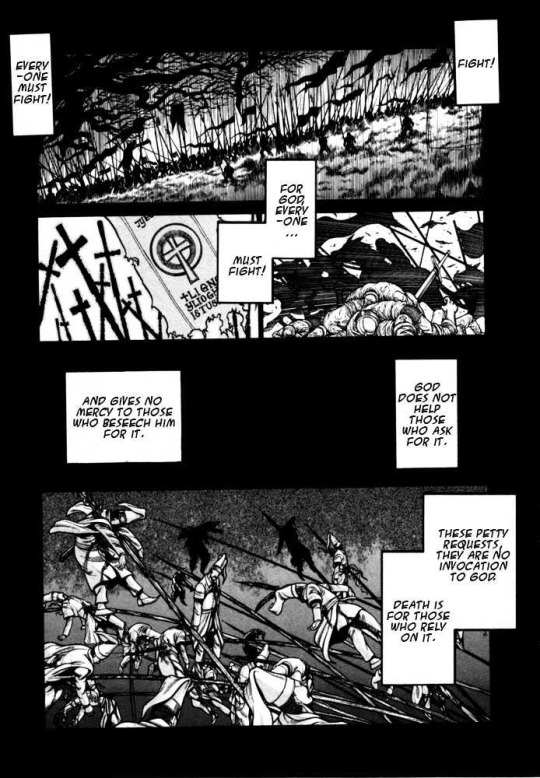
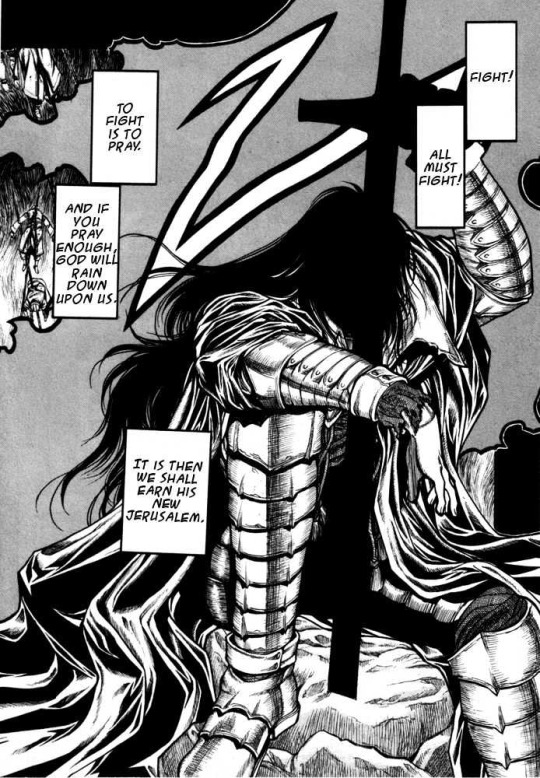
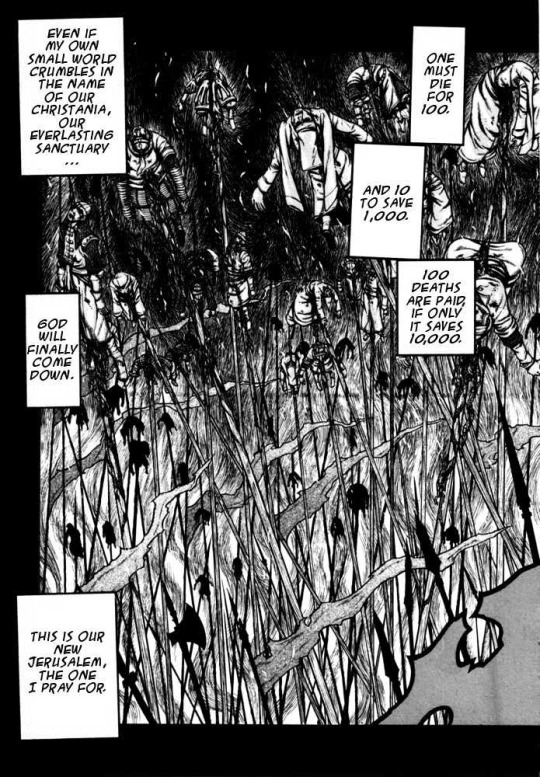
Hellsing: chapter 70 (Castlevania) He put his whole existence into his fervent worship of God, throwing himself in to battle was to pray and he was a devotee of the highest order. He gave everything in the hopes that God would descend, that he would finally be granted "Jerusalem" and victory for his efforts-- not praying for anything with the idea in mind that for your desires to be granted, you must fight hard enough and prove yourself worthy. But when that sacrifice amounted to nothing, he crumbled to the weight of his own despair, everything he worked for, everything he gave to make a better world for his people-- gone in an instant. His men all dead, his land burning, his hope dashed in the wake of his defeat. God didn't descend and didn't grant him that deliverance.
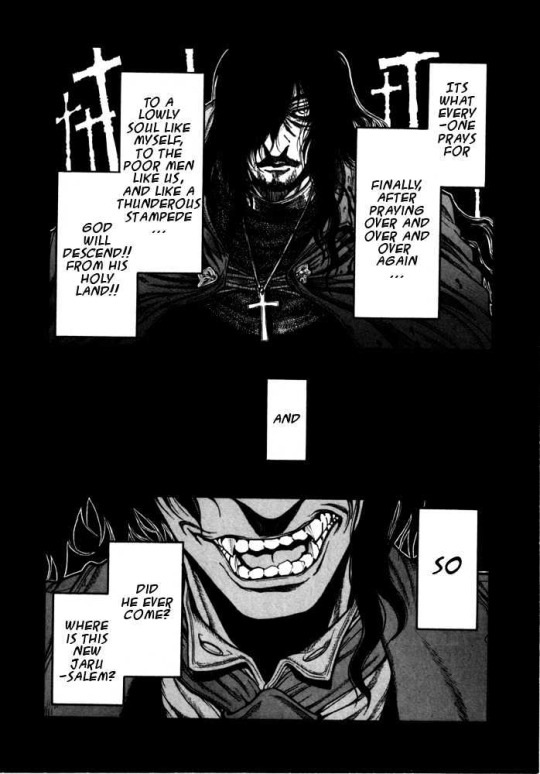

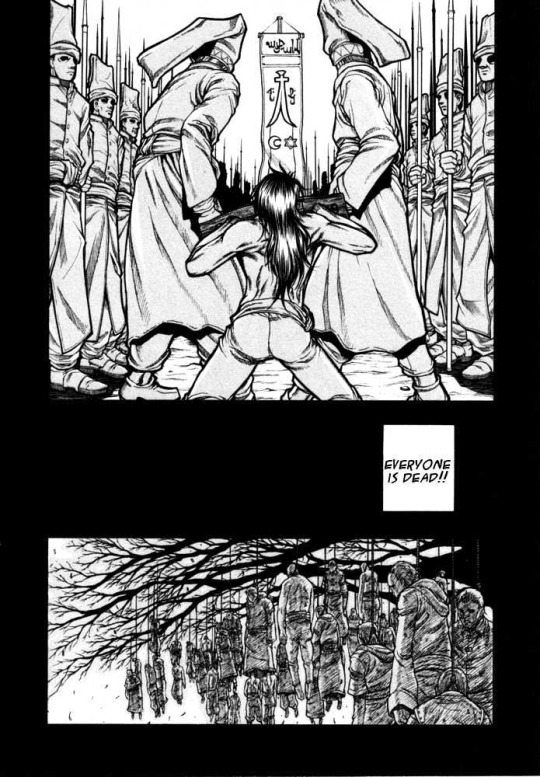
Hellsing: chapter 70 (Castlevania) So, instead of clinging to his faith to comfort him, he reaches for something real and tangible; The blood of his fallen soldiers in front of him. In a sense, this moment is when Vlad the Voivode, Vlad the human, gave in.
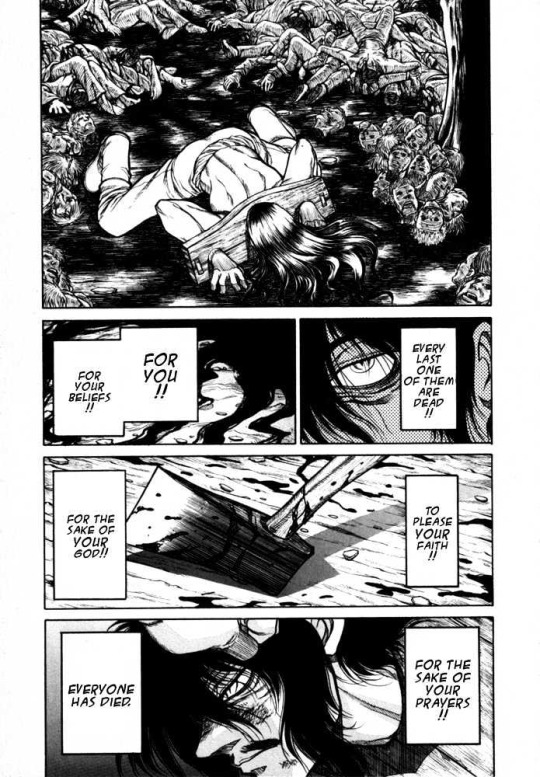
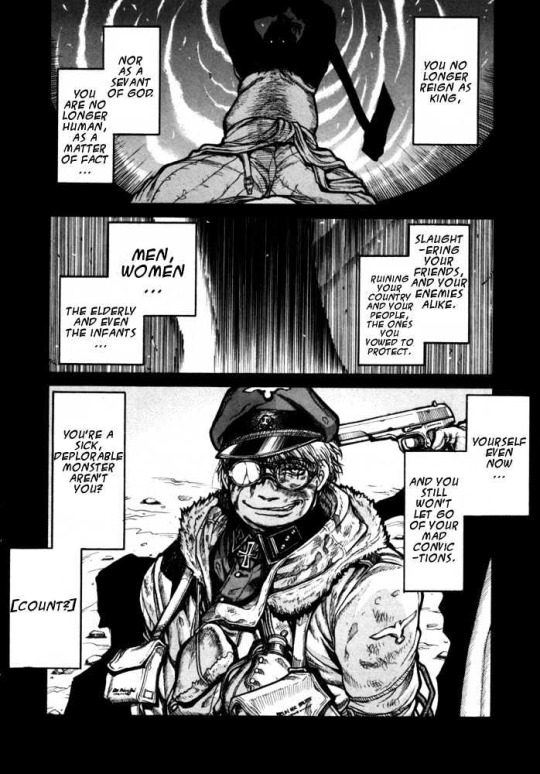
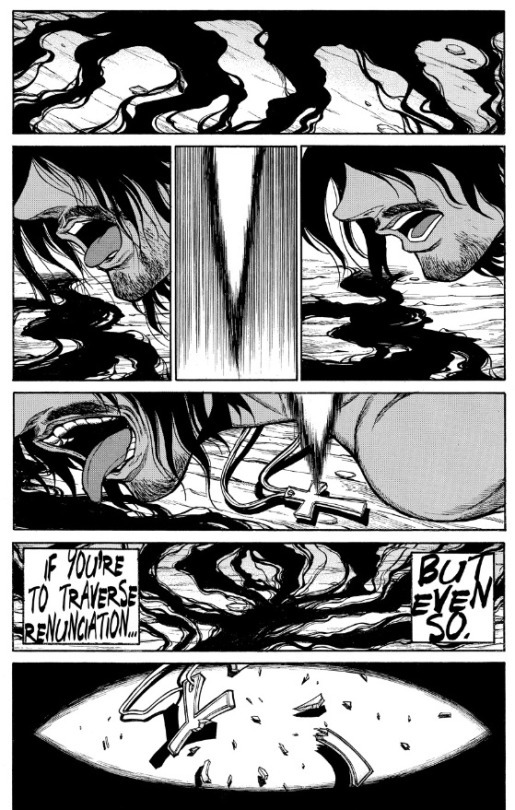
Hellsing: chapter 70 (Castlevania) In my opinion, with the themes in Hellsing, becoming a vampire/monster correlates to giving up and throwing away everything you ever stood for. It means becoming something less than human because you could not bear the weight of what it means to be human. And with Alucard, it's numbing your hurt by perpetuating your own pain and grief upon others. He couldn't handle his failure, so what he did was the equivalent of flipping the table and saying "fuck it." He is still dealing with the consequences of that choice hundreds of years later, unable to die, and bound to the service of a family that defeated him as Dracula. In a way, this could be considered a punishment? But I'm not gonna get into that right now. So, how does this relate to Anderson? Actually, this has a lot to do with Anderson. Because In Alucard's own words to Anderson. "You are me."
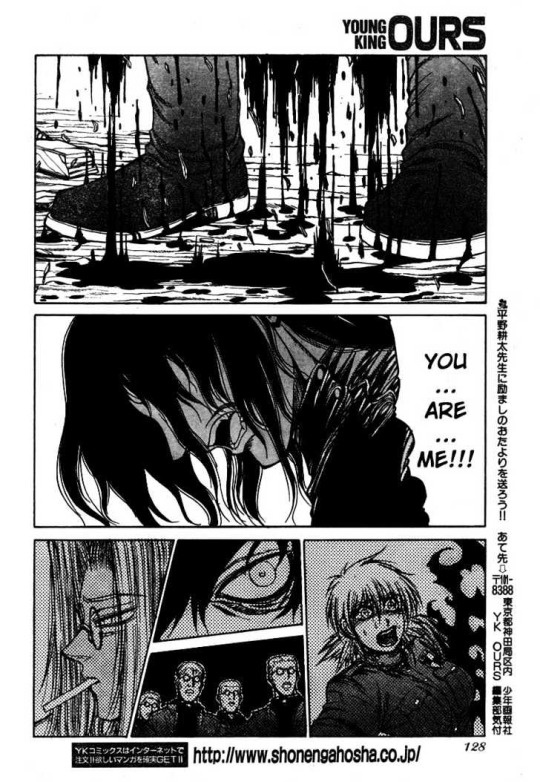
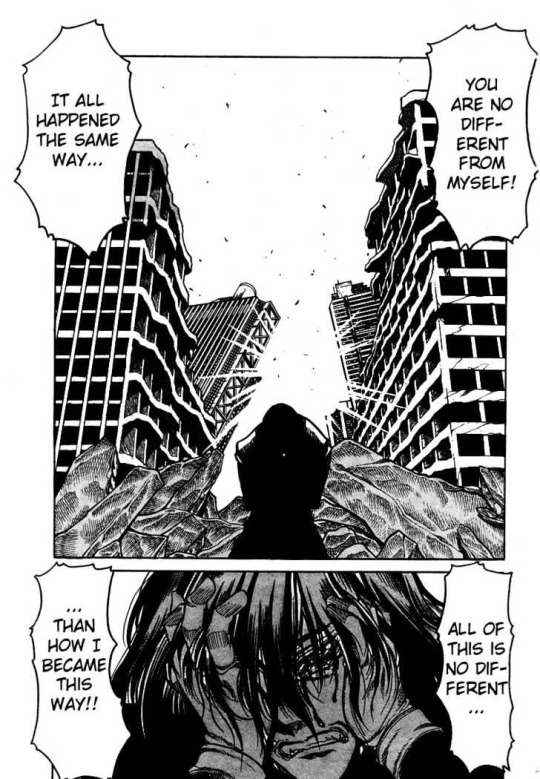
Hellsing: Chapter 72 (Heart Of Dream)
Like Vlad, Anderson is also a religious extremist. He may not have the same exact beliefs as Vlad, but the basis is the same-- the fervent worship of God to the point of committing immoral acts in his name. Along with that, Anderson became a monster in the same exact way as Alucard did when he was still a man. But Alucard actually pleads with him to not give up on his humanity. This could come from the fact that he's basically witnessing the darkest moment of his existence reflected back on him in Anderson. Watching the same pain, the same failure that he experienced all those years ago but in someone other than himself and he feels helpless to stop it. Because, once again, becoming a monster is a decision someone must make for themself and Anderson has very clearly made up his mind.
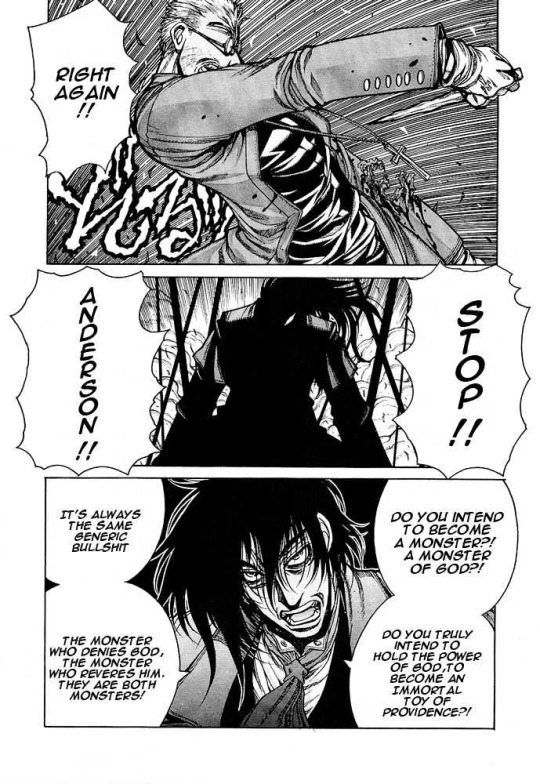
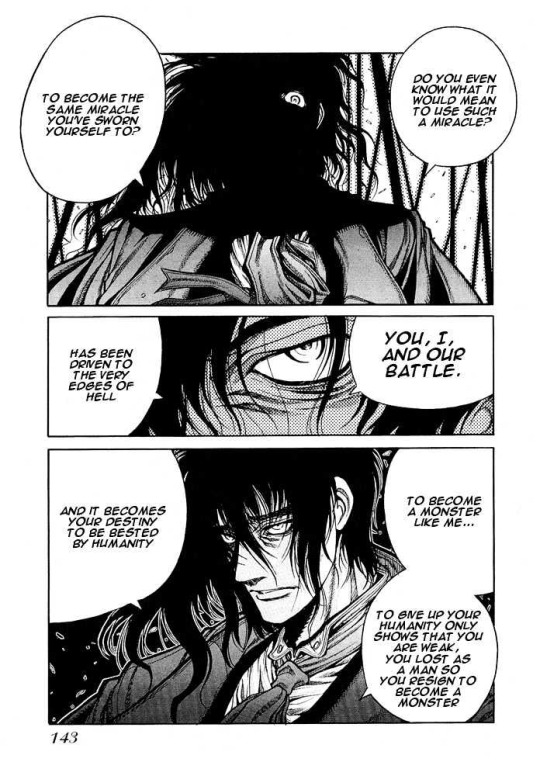
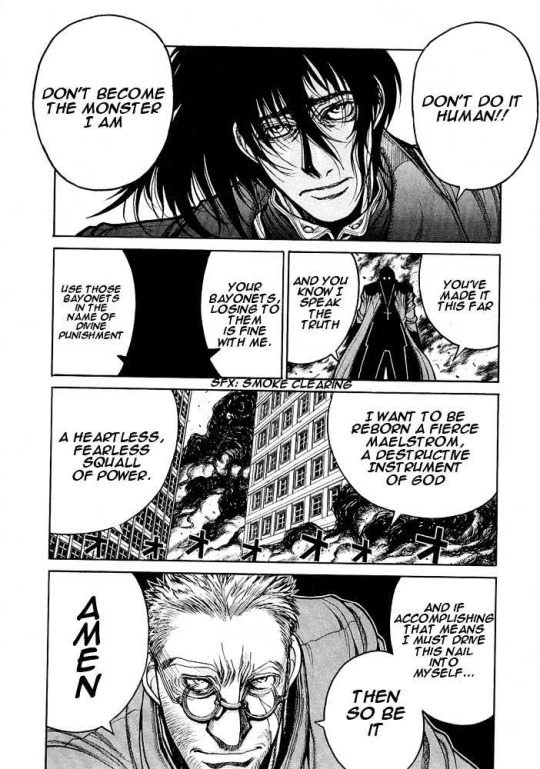
Hellsing: Chapter 67 (Might and Magic)
This is something that must be kept in mind, Anderson is a grown man who can make his own choices. He is very likely a man in his late fifties to early sixties and he can face the consequences for his actions. If anything, the reason why Alucard didn't "stop" Anderson is because of the fact that he may have not wanted to rob Anderson of his agency and the right to take his own life into his hands? This is especially evident with the fact that Alucard is canonically the equivalent of a slave, and is mostly not allowed to make his own choices. So it would be unfair and cruel for him to do that to someone who he deems worthy of beating him.
In the end, he lets Anderson utilize his agency and make his decision. That decision just so happened to be becoming a monster of God. Which, in Alucard's mind, is no better than becoming a vampire, and is still an act of cowardice all the same. The reasoning behind this seems to be wanting to be a vessel of holy wrath, to let something else take over so he doesn't have to experience emotions like pain or grief, considering he had just lost Maxwell, that was basically like his son by his own hand.
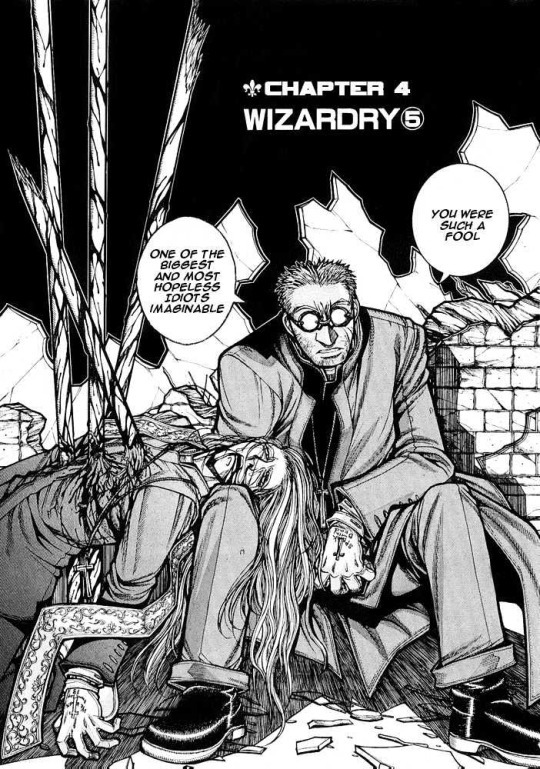
Hellsing: Chapter 62 (Wizardry)
Anyway, that's my rant over with. The point is, it's extremely reductive and just plain wrong to say that Alucard is responsible for the actions of another grown man. Along with that, it ignores most of the themes and parallels between their characters, considering that Anderson is basically a direct reflection of Vlad.
#spoliers#hellsing#hellsing ultimate#alucard#vladcard#alexander anderson#long post#character analysis#analysis#character study#I crave the discourse#this is a product of my frustration#Also-- can we please start using anti tags again? It's just rude to not tag character bashing.#Vladcard is my favorite 🥺👉👈
50 notes
·
View notes
Text



army dreamers, kate bush / fantastic mr fox, wes anderson / fantastic mr fox: humanising animals, animalising men, and an exploration of masculine identity, india k.b
#film analysis#essay#literary analysis#books and literature#fantastic mr fox analysis#fantastic mr fox#wes anderson#roald dahl#mr fox#felicity fox#web weaving#parallels#kate bush#army dreamers#kate bush army dreamers#hounds of love#kate bush lyrics#lyrics#music and lyrics#chicken and fox#foxes#chickens#movie quotes#film quotes#stop motion#copyright ikb#movie analysis#fantastic mr fox 2009
9 notes
·
View notes
Text
I don't think Isle of Dogs is offensive
I'll try to offer my reason as to why.
My letterboxd review here. I touched on it briefly
The Japanese characters are literally ordinary Japanese people, not stereotyped.
They look like people you'll see out in the streets while walking. I love how unique they all look, there's life to them.
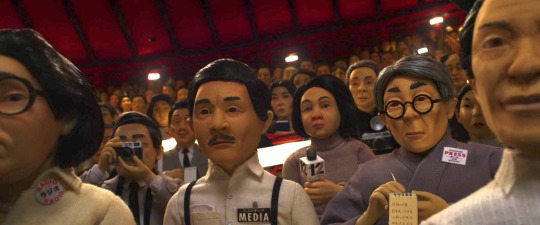
Why is the language unsubtitled? It's so that you're in the dog's perspective as the film is mostly about the dogs which are almost like dogs except it's rendered to be english (or whatever language in dubbing) the experience of not a language barrier is one all of us can relate to, we have to rely on body language as our second option which is what Anderson encourages with us (the viewer)
IMO the arguement of "no subtitles=dehumanising" is problematic in itself when you think about it. Implying that you have to have english to relate to the character otherwise they're not human enough.
They do not have yellow skin. This is color grading, same thing with Moonrise Kingdom. A lot of shots look like golden hour. Wes Anderson loves warm tones, there's no nefarious reason behind it.
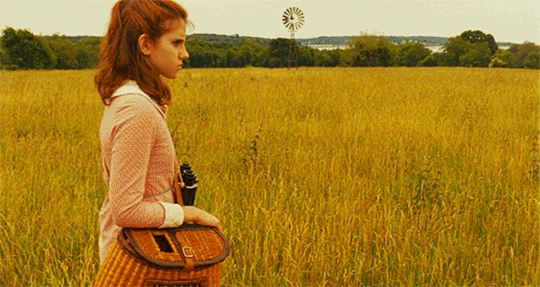
Let's take our scientist husband for example. One image depicts a shot in the film you notice that even when there's white like in the sky or his labcoat. It still looks warm

Here is a picture of Professor Watanabe's puppet

Also I would like to mention that this post contains spoilers so from here on. You have been warned :)
One such character is a subject is the foreign exchange student Tracy!
The blonde little orphan annie looking white girl.
I need to clear the elephant in the room and that's a misconception that Tracy is 17 and since Atari is 12 she's a pedo not like us. That's not true! I debunked that already😭 "B-but the IOD fandom wiki" THAT'S FULL OF SHIT! THEY SAID THAT A DOG MENTIONED BY NAME IS A MAIN CHARACTER! Her actual age is 14, so it's not a weird age gap or anything. I'll say that loud and clear until it's public knowledge.
Okie now that's out of the way, we'll discuss about her as a character.
I've seen people say that she's a white savior and she saved the Japanese people Megasaki which is not true. She didn't save anything in the end. The climax scene, she announces the truth and the crowd is dead silent. And Mayor Kobayashi literally threatened to deport her to ohio and also show her own dog about to be killed on TV like it's LiveLeak. Who actually saved the dogs and stopped Kobayashi? Atari because he went to the Island and avoided attempted rescuers several times, and all while being injured (the propeller clutch stuck on his head and also his limp) he presented to his corrupt mayor uncle about how innocent dogs are and that this is not the way to go which worked. Unlike Tracy's idea.
My interpretation is that Tracy likely represents the depiction of the american character in Japanese media. They are often the loudest and obnoxious.
I saw that take on reddit originally and it all clicked.

Like this^
Also ermmm technically🤓 puts *on my glasses* wouldn't the hacker kid be the real saviour because he prevented the dogs from even being killed☝️🤓
And Professor Watanabe because the dogs need that cure.
Speaking of Professor Watanabe, that means we'll have to talk about the sushi scene that activates something in our brain.
There is a few people saying that it's "demonising of Japanese people because it's portraying a sushi preparation and that why is it poison sushi?!" Which is the most stupidest take on this... -_-)
Do you know the restaurants that have tanks of fish and crabs on display, that's quite literally how they prepare the food. The fresher the food, the better it tastes. Also sushi is common food in Japan, it's casual.
Also I'm actually more of a Gyoza fan myself.
Also he got turned into a LiveLeak gore video but that's another topic.
Let's add some more additional context of the film.
The film was influenced by the films of Akira Kurosawa, Yasujiro Ozu and films such as Evangelion, 101 Dalmatians and Rankin Bass films. I see it as a homage to not only the listed from above but also Japanese cinema, it's a love letter of the cinema and appreciation of the culture while also being a cautionary tale of fascism and authoritarian regime. A parallel to another Wes Anderson film called The Grand Budapest Hotel.
Set in a fictional place called Zubrowka and is a homage to european cinema while also being a cautionary tale of fascism despite the film being in pink
You could apply all of the IOD discourse but rebrand it to Grand Budapest Hotel instead and claim that the film demonises eastern european/glorifies fascism, and the film is appropriation and whatever whatever.. both films tell you that innocent people caught up on all of this≠government but despite of everything, there is still faint glimmers of humanity. (Do you theorize that TGBH and IOD take place in the same universe?)
Back to Trash Island.. let's find another part I have to debunk is the most shittiest media literacy take I have came across myself (so far)
Basically saying that by referring to the aboriginal lab tested dogs as cannibals is there for demonising and stereotyping the native people of Japan which is an actual take I saw but it completely misses the entire point of that subplot😭 you cannot be this dumb to miss it. It's telling you that calling a group of people cannibals is not good at all not even implicit,
Spots was like "are you going to eat me? I heard you were cannibals"
Gondo responded like "who told you that dirty lie?"
It's a canon event to have an incredibly horrendous media literacy review/essay on your favourite piece of media and bringing actual serious topics as talking points
Also in my letterboxd review you can check the comments as I have linked some Japanese people's takes on the film. But there are people out there with varying takes on the film. Example is that I hate all autistic representation in media no matter how "good it is"
That's about it
FOLLOW FOR MORE BANGER WES FANDERSON CONTENT AND STUFF!!
(Also next watch of Darjeeling Limited I'll make an analysis of the film but not the discourse itself)

5 notes
·
View notes
Text
i am never going to move on from her constance and i hope you guys never do either. she is the most genuine constance i have ever seen portrayed to this day.
#the way she flinches back when she says “no you dont!” i am SOBBINGGG#rtc#ride the cyclone#constance blackwood#constance rtc#ride the cyclone constance#also she talks like a wes anderson movie and that makes me love her even more#i could go into such a serious analysis of her but i dont feel like yapping rn so i wont#but i COULD#if she were part of a more widely liked production she would be the most popular non-tour constance and i fully believe that. its the trut
34 notes
·
View notes
Text
Fantastic Mr. Fox is Fëanáro’s fursona; what the fuck
#Key takeaway from the Wes Anderson adaption I am at 110% intellectual capacity#Apologies if any of you follow me for detailed analysis tune in tomorrow probably for me ranting about alqualonde#Silm crack#silm shitpost#feanaro#feanor#curufinwe feanaro#feanaro curufinwe#silmarillion#silm#the silmarillion#the silm fandom#the silm#silm fandom#tolkien#jrr tolkien#Tolkien legendarium#Silmarillion shitpost
19 notes
·
View notes
Text
a look at poison by wes anderson.
Poison is by far my favorite of the four short film adaptations Wes Anderson has put out of Roald Dahl's short stories. Poison tells the story of Harry Pope, a white British soldier who fears that a krait, a poisonous snake, has crawled under his covers and is poised to bite him. He is helped by Timber Woods, an Indian-British soldier, and Dr. Ganderbai, a local Indian doctor. The film takes place at Woods’s house, where Harry Pope is staying, in British-ruled India. The film, like the other stories in the Dahl collection, is shot like a play, with stunning set work and stagehands at the ready to help with props.
The basic story, if you haven’t watched the film yet (which you should), is this: Woods drives home and finds Harry Pope laying in bed very, very still. Pope tells him that while he was reading in bed, he saw a krait crawl under the covers and fall asleep on his stomach. He has been lying still and silently since then. At first, Woods proposes that he, armed with a knife, pull back the cover, brush off the snake, and cut the snake and suck out any poison himself. Pope is scornful toward the idea, calling Woods an idiot, and tells him to call for a doctor. Woods calls Dr. Ganderbai, who makes his way over quickly. He first administers some serum to Pope, so that if he is bitten he (maybe) will be safe regardless. After debating with himself outside of the room, he decides to soak the mattress in chloroform, hopefully sedating the krait and saving Harry Pope. Dr. Ganderbai painstakingly funnels the chloroform to the mattress. For 15 minutes, the trio wait in silence, with Dr. Ganderbai staring furiously at Pope, after he has a loud outburst. The smell of the chloroform reminds Woods of an operation he went through, which left a scar on his forehead. Finally, Dr. Ganderbai and Woods prepare to lower the cover and remove the krait. When the cover is removed, the krait is not there. Dr. Ganderbai remarks that the krait could be anywhere, even up the pajama leg. At this, Pope, who has been growing increasingly twitchy, jumps up on the bed and moves furiously. When he does not die of snake bite, the room goes quiet. The camera work at this point has gone shaky, and the lighting flickers while a heartbeat plays in the background of the scene. Dr. Ganderbai teases, lightheartedly, that perhaps Pope dreamt up the snake. Snake hissing is now audible. Pope does not take the teasing jokingly however and is offended. He explodes at Dr. Ganderbai, yelling abusive, racially motivated insults. When Dr. Ganderbai breaks a chair and storms out the room, the lighting stabilizes, as does the camerawork, and silence permeates the set. Woods follows Dr. Ganderbai out the house and tells him that Pope doesn’t know what he’s talking about and that he (Dr. Ganderbai) saved Pope’s life. Dr. Ganderbai says, “No, I didn’t.” Woods tells him that Pope owes him his life. Dr. Ganderbai says “No, he doesn’t.” Woods apologizes. Dr. Ganderbai looks at Woods and says, “You can’t be.” With that, the film is over.
If you still haven’t watched the short film, then go do that. My summary does not do it justice.
This story is run in part by the three characters and the subtext in all of their interactions. Harry Pope is a white, British soldier. Timber Woods is an Indian-British soldier. Dr. Ganderbai is Indian and notably an outsider to the British military. Harry Pope and Timber Woods live on a British Jute and Woods is dressed in a British military outfit. At the beginning, the power hierarchy is not apparent. After all, Pope is immobilized in bed and cannot do anything to aggravate the krait, leaving him quiet and subdued up until the last minutes of the film. However, he is still expressive enough with Woods noting, “The expression was in the eyes and around the corners of the mouth, as you can see.” He manages to be derisive in his interactions with the two men, as is apparent when he calls Woods an idiot and snaps at Dr. Ganderbai: “Get on with it!” His clothing are a pair of light blue pajamas, simple at first glance, though Woods notes that he has a fly button made of mother-of-pearl. Woods remarks that he has never had a fly button, let alone a mother-of-pearl button. This is another difference between the two soldiers, their wealth. However, even in these interactions, Dr. Ganderbai and Woods treat him with kindness and patience. Everything that he is doing is attributed to the stress that the stillness is putting him under, with Dr. Ganderbai calling his behavior understandable up until this point.
Dr. Ganderbai approaches the situation with kindness and urgency. He takes every care to reassure Pope that he is in safe hands throughout the crisis. He only starts to lose his patience when Pope also loses his nerve. After Pope’s second outburst (“I can hear him!”), he stares at him, with Woods thinking that he is probably thinking something along the lines of this: “Don’t move, don’t speak! Damn you, you’re not spoiling this now, you hear me?” Even in his anger, he is silent and considerate of the life-threatening situation at hand.
Woods, the narrator of the whole story, is also considerate and kind. His first scene shows him turning the headlights of his car off immediately, so as not to disturb the possibly sleeping Harry Pope. He takes his shoes off (in his own house), following Pope’s peculiar, distressed orders. He is prepared to literally suck venom out of Pope’s stomach and even agrees with Pope’s assessment that he is an idiot for not thinking of calling a doctor sooner. He is thoughtful of Pope, despite the discomfort brought upon him by the whole situation, be that by Pope’s twitching and his derisive tone (“I didn’t like that. I didn’t like the way he talked either.”), or the smell of chloroform, which seems to remind him of an injury he incurred, possibly by explosion (this is entirely surmised through choice of words and is not definitive). Woods is only non-complacent when Pope does the inexcusable, though even afterwards he apologizes for Pope.
The playing field, which had Pope more or less at the bottom the entire time, switches the minute Pope is offended at Dr. Ganderbai’s joke. It is now that race bulldozes its way into the story. Pope is a white soldier belittling an Indian doctor who has just taken painstaking measures to save his life. These two represent the two opposite ends of the tense atmosphere that was all of British-ruled India. Pope’s twitchiness, everpresent while he was arrested by the snake, explodes via the words every white supremacist has felt when confronted with somebody of a “lesser” race. The intricacies are most beautifully conveyed via subtext in the ending, which apparently has confused other viewers of the film. The dialogue goes something like this:
“You saved his life.”
“No, I don’t think so.”
“I- I mean, you might’ve- He owes you his life, I mean, he owes you his life, doctor.”
“No, he doesn’t.”
Beat.
“I’m sorry.”
“You can’t be.”
Dr. Ganderbai refuting that Pope owes him his life, isn’t a show of humility. It’s the caste systems reasserting itself. Dr. Ganderbai knows that there is no way that Harry Pope, a white soldier, owes anything, let alone his life to an Indian. And when Dr. Ganderbai tells Timber Woods that he cannot be sorry, it is not because he thinks that Woods should not apologize on Pope’s behalf, it is because Woods literally cannot be sorry or remorseful. He is a part of the system, though he may not have the same power as Harry Pope. Timber Woods, after all, is a British soldier. He wears the British uniform and lives in a British jute. How can he be sorry, when he wears the uniform of the institution that created the circumstances where Dr. Ganderbai can be treated like that?
The other driving force of the story, as is the case in any Wes Anderson film, is the camera work and editing. It is most evident in the climax. The minute Harry Pope jumps on his bed, the camera goes shaky-hand and the lighting flickers. A heartbeat plays throughout the following scene. Up until this point, the camera has been steady and smooth, emphasizing the play-like feeling the story holds. When the fourth-wall is broken, it reminds the audience that this is a play, or it should be treated like one. The shift happens right before Dr. Ganderbai enters Pope’s room to administer chloroform. The last look he gives is one that is severe, a sign of the tense scene to follow. When Woods interprets Dr. Ganderbai’s silence, that is also a moment where the fourth wall is broken. Dr. Ganderbai steps forward and a spotlight is shown on him. We are still in a play element. With the shaky camera work, the breaks are more personal and feel more like a call for help or affirmation that they (Woods and Dr. Ganderbai) are not the only ones seeing this. It is also in the context of the shaky camera that the snake is most “visible.” A rattling noise plays in the underscore of the entire scene. Right before Pope opens his mouth to start his rant, a snapping sound is heard, like a snake snapping its mouth closed. The feeling of suspense, of danger, is helped by Woods whispering again, as though the snake has reappeared. The heartbeat goes unsteady and varies in volume and rhythm. When Dr. Ganderbai leaves the room and Woods pulls a knife on Pope to get him to shut up, the heartbeat stops, as if dead. The lighting evens out and we go back to the steady camerawork. The shaky hand makes the moment, the crucial climax, feel real and immerses the audience even further. The last break is when Woods makes eye contact with the camera after Dr. Ganderbai tells him he cannot be sorry, with a sort of somber look. Finally, one last little touch is the book that Harry Pope is reading, The Golden Lotus. Though I personally have never read it, it is a story about two women who are fighting for prestige in their clan, which is declining in power. A fitting story for a British man to be reading, I think.
Poison is a masterclass in subtext and should be required viewing for anybody trying to be a visual storyteller. It is my favorite of the short films released and every time I think of it and the story it tells, I cry. It won’t be the most relatable for any caucasian viewers, but as somebody who has been micro aggressed in my workplace more times than I can count, with seemingly no motivation, I don’t care. It’s brilliant.
23 notes
·
View notes
Text
Another miscellaneous text post on a movie no one cares about: The Royal Tenenabums and horses
Someone else has had to have analysed this by now but I've been itching to post something about it since I wathced The Royal Tenenbaums (2001) with my friend and his mother several weeks ago (albeit for the sixth time because the autism is autisming) and his mother brought up something incredibly interesting to me that explains very complex characters in a simple but in my opinion, perfect way.
Margot Tenenbaum is a zebra, we see zebra symbolism relating to her all throughout the movie, from her wallpaper, to the zebra costume she wore on her 11th birthday, to the zebra exhibit she and Richie slept under at the museum as children. Margot has felt out of place her whole life, like a zebra in a family of horses, she feels like she never was a genius and the only one of the Tenenbaums she could truly connect with was Richie (which is a discussion for another day). We know she was purposefully excluded from multiple family activities throughout her childhood and was constantly introduced by Royal as his "adopted daughter". She wanted to seek out her 'real' family in the first place as she was made to feel like the Tenenbaum household wasn't somewhere she was meant to be.
Chas, Richie, Royal, Etheline, they're all horses, a stable of horses that Margot was lost in (I am by no means a Margot sympathiser by the way, I have my reasons).
Eli Cash, he obviously has a pretty overarching cowboy aesthetic but in the way where he's notably slightly obsessed with chasing after and wrangling wild animals (note the magazine cover where he stands shirtless clasping a snake by the neck in each hand). What throughout pop culture are cowboys known for trying to capture? Horses. Eli has spent his entire life chasing after a false idea of what the tenenbaums have, trying to lasso their fame, their fortune, the sense of belonging and appreciation he thinks they have. But given he was only looking at a false idea of their lives he saw through rose coloured glasses it'll never be attainable to him. He's spent his whole life at this point like a dog trying to bite it's own tail creating a deep void within him that he chooses to fill with drugs and reptiles and homoerotic paintings, but deep down he's still somewhat self aware that he's really just an average b-list author.
And finally, to add a very minor detail to this theory. At the end of the film when Chas's dog Buckley, is hit by Eli's car, royal gives them a dalmatian. This might not seem signficant at all, but in an unrelated google search journey trying to find out why dalmatians were so specific to fire-fighters I discovered they were selectively bred to guide horses. This exchange occurs slightly before the movies resolution where the characts despite what it may appear, don't exactly get happy endings but return to a sense of slightly better yet still undeniably sombre normaly. If the tenenbaums are horses, this addition of a new dog symbolises moving back into a rythm of sorts. A consistent trot throughout the dreary landscapes of their lives.
31 notes
·
View notes
Text
"oh it's not about ANYTHING that's what's so cool, it's about being confused-"
*slaps you*
Shut up!!! That's not what it's fucking about! You can't see something confusing, fail to analyze it, and then say it's about being confused! That's such a lame self-own! C'mon, apply more skills! Apply more critical thinking!
*shaking you*
There was a weird CGI alien! There was a scene where a room full of people all chant the same weird phrase! The kids play a game about memory, and an identical car chase happens like 3 times throughout the movie! You think all that shit is just to be quirky and random?
#serious post#asteroid city#wes anderson#film#such limp dicked analysis man smfh#later on i find out the movie really is just about being confused about what a movie is about and i die on the spot
13 notes
·
View notes
Text
Let me continue from vole-mon-amour

As you can see Mulder is soft and starts to care about Scully not because is love at first sight but because it is the relationship between partners (Start with Season 1). Mulder knew no one understood him even Scully but Scully as a partner, chose to not leave him even though at first she did not believe in aliens. The relationship between them at first is just like Demi Lovato and Simon Cowell on the X Factor. In Demi's view who calls Simon a grumpy old man, this is the same thought as Scully at first.
As you can see in the X Files Bloopers- Seasons 1, if you compare to that picture scene, what Mulder did here or his feelings, this is the real Mr David Duchovny for Miss Gillian Anderson in season 1. At first, Miss Gillian tried to learn her role and it was super hard for her at first but Mr David Duchovny taught her and always be with her(Until today they're the best(just forget chemistry that they're doing-_-;)) That's why I watch only season 1-4 because that jerk Mulder is the real Mr David Duchovny in his role.
#the x files#txf s1#david duchovny#gillian anderson#fox mulder#dana scully#analysis#character analysis#behind the scenes#as we see how the protagonists of Fox Mulder the Believer and Dana Scully the Skeptic continue to influence how characters are shaped
3 notes
·
View notes
Text
FUCK YOU IM SOBBING
one of the things that always destroys me about Neil’s death was that it was decently into December, so Todd probably had a Christmas gift picked out for Neil that he never got to give to him
#anderperry#dead poets society#dps#dead poets#dead poets fandom#neil perry#neil perry dps#todd anderson#todd anderson dps#dps analysis#this fandom is a prison#we are allergic to happiness i think#:(#i am sob
177 notes
·
View notes
Text
I think I figured out where Isle of Dogs is set in based on a low quality image.
Since it's set in Japan I wondered (WHAT PLACE?!) so I turned to my favourite scene again... by that I mean the conspiracy wall
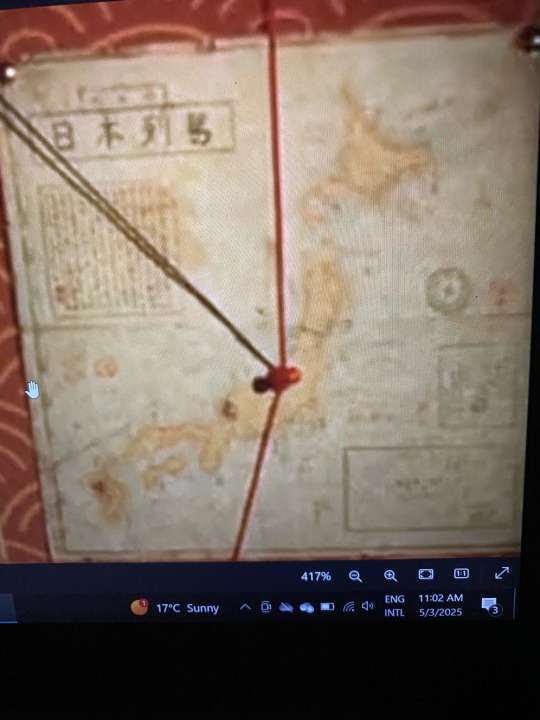
Here's the original image. The quality is weird but you can tell that's Japan
The text says (日本列島) which means Japan's Archipelago.
So I went onto maps and tracked where this dot is on.

Ladies and Gentleman. Megasaki City would probably be in Niigata Prefecture!
The city is in a fictional prefecture called Uni Prefecture but if it was in the real world it'll be in Niigata,
6 notes
·
View notes
Text
Short Circuit
pairing: connor (rk800) x reader words: 1k summary: reader sees Connor outside of work for the first time in normal human clothes and dies a little bit (comedy, fluff) warnings: language, lack of proofreading, fic from reader's pov a/n: let's pretend this is after the good ending and androids can own property now cause we're going to Connor's place etc
------------------------------------------------------------------------------
Words cannot describe the amount of hate I have for Fowler. On my day off he asks me to take some evidence over to Connor for a 'quick analysis', like, Jesus Christ dude wait for the labwork like the rest of us. The nerve of this guy, honestly. Anyway, if you were wondering why I was driving to Connor's place first thing on a Sunday, that was it.
Yes, I hate my boss, how original, but I would never pass up an opportunity to see Connor. Sure, he's my colleague, but he's also my friend. And also I may be in love with him have a normal, tiny, minuscule crush on him. I don't know how it happened, I didn't even realize it, but yes, I do, in fact, have feelings for Connor. "Oh but he's an andro-" Go fuck yourself, he's more human than most people these days.
Before I realized it, I was at his place and almost knocked on his door. Almost being the keyword here, because I heard a voice from the inside.
"Detective! Just a minute. I will be right there."
"Holy shit, how did you know? Let me guess, X-ray vision?" It's always something with him. Of course, Cyberlife's most intelligent android comes with X-ray vision. I feel stupid for not guessing right away. Wait, does this mean he had X-ray vision all this time? That feels like an ethical grey area. Is that allowed? My rapid descent down that rabbit hole was interrupted by the sound of the door being unlocked.
"Ring Camera. Come on in!" He led me inside and I absent-mindedly followed him before I noticed it. He was wearing a T-shirt and sweatpants. Connor Anderson (legal name, yes), android detective by day, who famously only wore suits, was standing in front of me, in goddamn sweats. And he looked like he stepped right out of my dreams.
I did not know it was possible to be any level of attractive in fucking pajamas, but oh my god, it absolutely was. He looked hot as hell. I don't know if it was from having only seen him in formals, or the fact that Kamski knowingly made a hottie, but I was reveling in this sight.
His T-shirt fit him exactly as it should have, and his sleeves stopped halfway through the biceps I didn't even know he had. His hair looked unkempt and tousled, which was questionable because there's no way he slept, right? I was very sure he could hear my heartbeat because that sucker was betraying me and beating way too fast.
I could not form coherent thoughts for another full minute or so. I am not even holding back, he genuinely looked so attractive he quite literally stole my breath away. All I could do was mumble nonsense while staring at him like I misplaced my glasses.
"Detective, are you alright?"
"What? Me? Yeah, no problem, bud." Bud???? I'd have slapped myself if I could.
"Your body temperature is rapidly rising and your heart is displaying signs of arrhythmia. I suggest we-"
"I suggest we nothing, Connor. I promise I'm fine." See that kids, right there, is what we call a bald-faced lie.
"If you say so. What brings you here, detective?"
"Detective? Come on, we're not at work, man. Chill."
"Alright then, (Y/n), what brings you here?" (Y/n). The way he said my name made me want to explode. Sure, everyone says my name, its my name but oh my god, when he says it, he makes me want to change my last name to his. Which would be Hank's. Huh. That's weird.
"Right, yeah, work stuff. Fowler sent me with evidence for you to analyze. Apparently, they can't wait for the lab like the rest of us mortals." I shoved the file into his hands a little too quickly, hoping he wouldn’t notice how my hands were shaking. He noticed.
"Your hands are trembling." Of course he noticed. Connor notices everything.
"I'm just… cold," I lied, despite standing in his very well-heated apartment.
Connor tilted his head slightly, that signature analytical look of his making me want to crawl under a rock. "You appear to be experiencing stress. Should I—"
"Connor, no. I don't need an analysis, I need to… sit down." That was the best I could come up with. Great. Very smooth.
"Please, make yourself comfortable," he said, gesturing toward his couch. I moved to sit down, hoping a change of scenery would calm my nerves. It didn’t.
Connor sat across from me, still in those damn sweatpants, his expression unreadable as he opened the file and started flipping through its contents. His focus should’ve made me feel at ease- it was just Connor being Connor- but instead, I found myself staring at his hands. They were annoyingly perfect, like the rest of him, and I couldn’t stop imagining what it would feel like if he- nope. No. Abort mission.
"Is something wrong with the file?" he asked suddenly, looking up.
"What? No! The file's fine. Great file. Top-tier evidence. You're gonna love it." Jesus Christ, someone take my mouth away.
Connor raised an eyebrow. "You’re behaving… unusually."
"I’m behaving perfectly normal," I said, crossing my arms in what I hoped was a casual way but probably looked defensive. "Maybe you're the one behaving unusually. I mean, sweatpants? Who are you and what have you done with Connor?"
He blinked, then looked down at himself as if realizing for the first time what he was wearing. "Hank suggested I try some human rituals like pajamas and sleep to better accommodate my deviancy. He claims it’s a key aspect of ‘human relaxation.’ Was this choice inappropriate?"
"No!" I said, a little too quickly. "No, you look—" amazing, perfect, hotter than anyone has a right to look "—fine. You look fine."
Connor studied me for a moment, and I swear I saw the faintest flicker of amusement cross his face. Was he… smirking? Oh no. Oh no, he knew.
"You should consider it," he said, casually returning to the file.
"Consider what?"
"Relaxing. You seem… tense."
And just like that, the ball was back in his court. I was flustered, he was composed, and I was left wondering how I was supposed to get through the rest of this visit without making a complete fool of myself.
Spoiler alert: I didn’t.
a/n: y'all, this is my first time writing dbh, sorry if it sucks T_T
#detroit become human#connor x reader#dbh connor x reader#rk800 x reader#dbh connor#connor rk800#connor rk800 x reader#rk800 connor x reader#maya writes#dbh#dbh x reader#connor x reader fluff#dbh rk800#dbh fluff
573 notes
·
View notes
Text
Some disjointed thoughts on the bathroom scene/needle in the hay scene from The Royal Tenenbaums (2001)
ok first up, major tw for suicide/suicide attempt, and spoiler for The Royal Tenenbaums (do I need to spoiler warning for a movie from 20+ years ago, I don't know). If you haven't seen the Royal Tenenbaums go watch it and come back to this, hell, watch it twice if you want.
I geniunely believe the bathroom scene from The Royal Tenenbaums is one of the most interesting and important scenes in Wes Anderson's entire portfolio. It might seem insigificant if you watch his movies from oldest to newest, but if you go backwards you might notice some stuff. A lot of the darker moments of his films are still coated in a layer of whimsy and a lot of his typical aestheticism, especially in his newer stuff. Not that that's a criticism at all. But when you look at the bathroom scene it has this unique rawness to it that I've never really seen anywhere else in all his movies. It feels like all of the layers that his characters tend to sheild their emotions with have suddenly and viscerally been ripped away. And the visuals of this scene contribute to it too, it's two things not often seen in Wes Anderson movies: very saturated and somewhat dark/has dimmer lighting. The bathroom feels so out of place in a way that really makes you sit up and go "oh shit, something's happening", the music too, not only does the song choice never fail to make me sob, but the way it stays quiet as Richie stares into the camera and cuts his hair off, and at the final moment of tentsion as his life flashes infront of his eyes the background music slowly grows louder, climaxing as he bleeds onto the tiles before finally stopping abruptly.
The scene itself is truly one of the best scenes Wes Anderson has under his belt too, despite bringing me closer to tears every single time I happen to watch it. Something that'll always stick in my mind is the exact moment Richie Tenenbaum takes off his glasses, the first time in almost the whole film where we properly see his eyes. Richie is a character that has been hiding, both literally seperating himself on humanity by living on a boat for the last four years before the beginning of the film, but also mentally. He's clearly bottling up all his emotions and problems throughout the film (symbolised by the sunglasses, long hair, beard, even margot's line "stand up straight, let me get a look at you") until he cracks under the weight of them and we get, well, the bathroom scene. Seeing his eyes not only, as the saying goes, gives us a window into his soul, but also truly communicates the amount of pain he's in. Pain that's beyond margot, beyond Royal's betrayal of him, and deep within himself.
Richie never finishes shaving, and in my opinion it's a nod to the fact that he himself as a person is unfinished, unresolved, incomplete. Even his plans lay incomplete with the death that would have met him if he wasn't found by Dudley. His only line in the scene is simply "I'm going to kill myself tomorrow" unfinished because well, he tries to that day. Richie to me is one of the most interesting characters in the movie, if not the most. I didn't think that on my first watch-through, but as I watched the movie again and again it quickly became my opinion. He's someone who unlike Chas and Margot is holding onto an idealised version of his childhood, still mentally stuck there and unwilling to believe Royal as a bad person because of the blurred vision of him that he saw as a kid. His concept of human connection is as equally broken as Margots but instead of filling the empty abyss left by it with unpassionate affairs such as her, he cuts himself off from society, and once he's ripped away from and pulled back into the very family he always thought of as a perfect world he breaks just a little more.
I find his relationship with Margot very interesting too, as I don't belive it's simply a case of "these two flawed people are doing something socially unacceptable because they're flawed". Infact, from Richie's point of view I don't even believe it's romantic. Margot and Richie clearly became codependent on eachother from a very young age due to the childhood they were put through by Royal and to a lesser extent Etheline, and as they grew into emotionally broken people with twisted ideas of love and connection they mistook their relationship for romantic love instead of a platonic relationshop, because that's the only way they know to express a close platonic relationship. Being reuinited with Margot is the only thing keeping Richie together throughout the film and when he learns of all her infidelity he unravels immediately something that was hinted at, began to slip through when Richie puts his hand through the bird cage after Raleigh shares with him his suspicions of margot cheating, he's lost his last coping mechanism in other words.
And so we return again to the bathroom scene, hopefully this helped whoever may be reading it appreciate such a tragic scene a little more, or maybe it just made it sadder, I'm not sure. Stay safe out there and remember that help is always available and things will get better.
13 notes
·
View notes